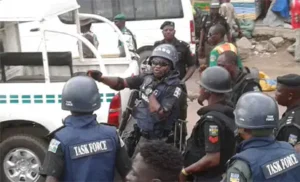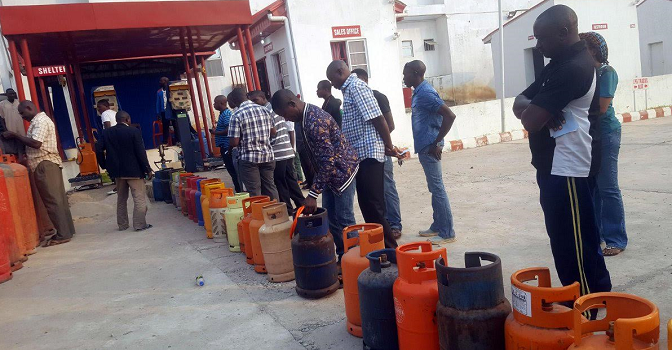
VIDEO: Task Force Dislodges Street Traders in Lagos
- Metro Plus
- 01.09.2025
- No Comment
- 67
VIDEO: Task Force Dislodges Street Traders in Lagos

The exercise, which was carried out on Sunday, formed part of the government’s ongoing efforts to restore sanity, improve urban order, and ensure free movement in one of the state’s busiest commercial hubs.
A video of the operation, which has since gone viral on social media, shows Task Force officials dismantling makeshift stalls and warning traders against returning to the sidewalks and road corridors.
The move has sparked mixed reactions from residents, business owners, and civil society groups who argue about the delicate balance between urban order and economic survival.
According to the Lagos State Environmental Sanitation Corps (LAGESC), the exercise became necessary following repeated complaints from motorists and pedestrians about obstruction, congestion, and safety hazards along Bishop Oluwole Street.
Officials explained that traders had converted walkways, drainage setbacks, and road verges into business points, thereby violating existing regulations and creating health and security risks.
The Task Force emphasized that the clampdown is not only about beautification but also about ensuring safety and compliance.
Authorities have also stressed that most illegal street markets expose consumers to unhygienic conditions, poor waste management, and risks of accidents.
In a statement released after the Sunday operation, a government spokesperson said:
“Lagos is a mega city and our streets cannot be turned into illegal markets. While we understand the economic realities, there are designated markets and business spaces provided by the government and private investors. We urge traders to move to these spaces where their businesses can thrive legally.”
A petty trader who gave her name as Mrs. Abimbola told reporters that she had been selling fruits on the street for over five years and depended on daily sales to support her family.

“I have nowhere else to go. Market stalls are too expensive, and people buy more when they see us on the road. Government should provide affordable alternatives before chasing us away,” she lamented.
Some residents, however, praised the Task Force, noting that street trading often causes traffic gridlock and makes the area less attractive to investors and visitors.
They argued that illegal trading reduces property value and poses significant risks to road safety.
Despite several laws banning the practice, enforcement remains difficult due to high unemployment, population growth, and poverty.
Many Lagosians rely on street trading as a primary source of livelihood, while consumers continue to find convenience in buying goods on-the-go.
Experts in urban planning argue that unless Lagos addresses the root causes, including lack of affordable formal trading spaces and economic inequality, the problem may persist despite repeated enforcement operations.
On one hand, the Lagos State Government seeks to project an image of a modern, orderly megacity attractive to investors and tourists.
On the other hand, thousands of families depend on informal trade to survive daily economic hardships.
Analysts believe that a holistic approach—combining enforcement with sustainable alternatives such as micro-markets, subsidies for stalls, and job creation programs will be crucial to addressing the issue in the long term.
The Task Force has also warned that defaulters risk arrest, fines, and possible jail terms under the state’s environmental and traffic laws.
Residents and business owners are hopeful that this marks the beginning of a more sustained urban order in Victoria Island.
However, civil society groups have called on the government to accompany such enforcement measures with meaningful economic support for displaced traders.
While the government seeks to enforce order and ensure safety, many traders face the grim reality of survival in an economy with limited job opportunities.
For a lasting solution, experts recommend a dual approach enforcement alongside economic empowerment programs.
As Lagos continues to grow into one of Africa’s most dynamic cities, balancing urban order with the livelihood of its people will remain one of its biggest challenges.







